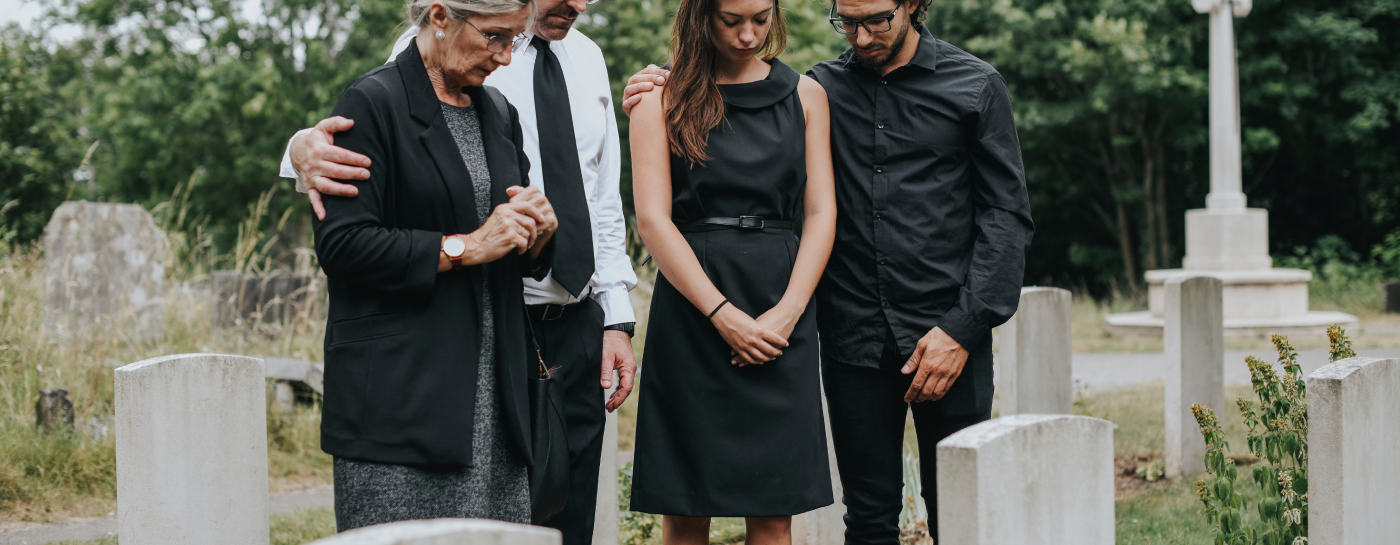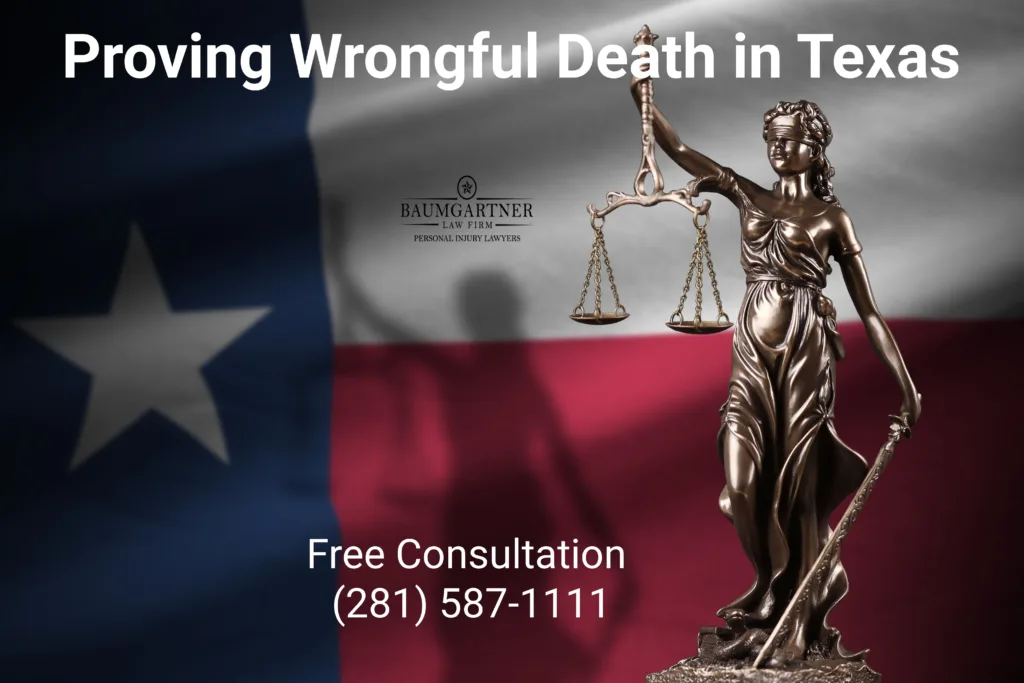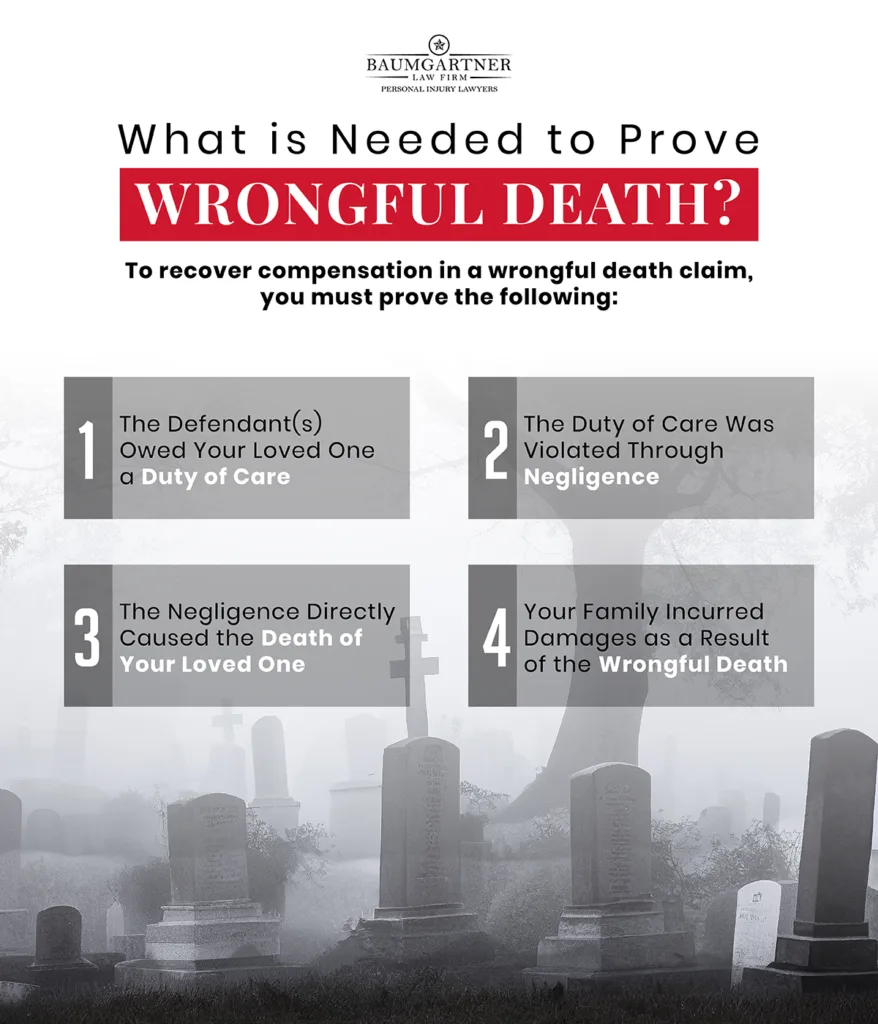
Proving Wrongful Death in Texas?
Losing a loved one is never easy, but the pain can be even more unbearable when it happens due to the negligence or intentional actions of another person or entity. Wondering what is a wrongful death? In Texas, it is considered a wrongful death when someone dies due to someone else’s wrongful acts. Proving a wrongful death in Texas will usually require an experienced wrongful death attorney near me.

A Wrongful Death Lawsuit is a Claim for Damages
Wrongful death in Texas is a civil claim filed by certain family members against a defendant.
Proving wrongful death in Texas for civil damages requires meeting certain legal criteria, and having a skilled personal injury attorney by your side is crucial to handling the complexities of the legal process. Call us to talk with a top wrongful death lawyer in Houston.
The plaintiff must first prove a duty of care to establish a successful wrongful death claim in Houston, Texas.
What is a Duty of Care?
The plaintiff must demonstrate that the defendant owed a duty of care to the deceased person. This duty of care typically arises when there is a legal obligation to act reasonably and prevent harm. The deceased person’s estate or a surviving family member proves the breach.
A duty of care can be proven by a statute or other legal obligation to act reasonably. For instance, drivers in Texas are required to not speed and follow traffic laws. The statute and rules establish the conduct expected by a driver, which is a duty.
Proving a Wrongful Death from a Car Accident
Example: A driver loses control of his car and runs into another vehicle, causing a car accident. In this example, the driver must act reasonably and maintain vehicle control. If the driver did not act reasonably or violated a traffic law in Texas, they may have breached the duty they owed to everyone on the road with them.
A wrongful death claim can be proven in this example by witnesses, accident reconstruction experts, police officers, and other testimony.
Proving a Wrongful Death from a Construction Site Accident
Example: A contractor employed subs to do work on a project. The contractor controlled safety for the job site and allowed unsafe practices, resulting in a fatality. Because the contractor controlled the safety on the site, they may have breached their duty to keep the site safe.
In this construction accident example, a duty can be established by control over the worksite. OSHA violations are commonly used to prove negligence by a contractor, sub, or owner in fatal accidents at construction sites.
Elements to Prove Wrongful Death Claims

Breach of Duty:
The plaintiff must establish that the defendant breached their duty of care. This means showing that the defendant’s actions or lack of action fell below the standard of care expected of a reasonable person in similar circumstances.
In our examples above, the driver breached his duty by not controlling his car. In example number two, the contractor breached his duty to keep the project reasonably safe.
Causation:
The plaintiff needs to prove that the defendant’s breach of duty directly caused the victim’s death. Establishing a clear and direct link between the defendant’s actions and the death is crucial.
The causation of the wrongful death action must be directly linked to the actor’s negligence. It is not enough that negligence occurred or that a duty was breached; the actions must have been a factor in causing the accident. In our construction accident example, the failure of the contractor to keep the project safe must have been directly related to the fatality.
For example, if the fall equipment were defective, a fall would have been needed to cause the death.
Damages:
Finally, the plaintiff must demonstrate that they have suffered damages due to the wrongful death. These damages can include funeral and burial expenses, medical bills, loss of financial support, loss of companionship, and emotional distress.
Damages are mainly the emotional trauma of the family due to the loss of their loved one. While economic damages are always a part of the damages, grief and mental anguish are almost always a big factor.

Who Can File a Wrongful Death Claim in Texas?
To file a wrongful death claim in Texas, you’re required to meet at least one of the following criteria:
- The wrongful death laws in Texas permit the immediate family to initiate a lawsuit, including parent(s), spouses, and children.
- Texas wrongful death claim laws permit the adopted family, including adopted parents and children, to initiate a lawsuit.
- The wrongful death laws in Texas permit the personal representative of the deceased’s estate to initiate a lawsuit.
What is the Legal Standard to Prove Wrongful Death in Texas?
Losing a loved one is a devastating experience, and when their death results from someone else’s negligence or intentional act, it can be even more difficult to cope with. Like in many other states, Texas has a legal standard to prove wrongful death. Texas has a statute of limitations for wrongful death suits, so act quickly.
Understanding this standard is crucial to seeking justice for your loved one and considering legal action. The legal standard to prove a wrongful death suit in Texas is outlined below.
The Preponderance of the Evidence
In Texas, the legal standard for proving civil wrongful death is based on a preponderance of the evidence. This means that the plaintiff must show that it is more likely than not that the defendant’s wrongful conduct caused the death of their loved one. Unlike in criminal cases, where guilt must be proven beyond a reasonable doubt, the burden of proof in a Texas wrongful death damages case is lower.
To establish a wrongful death claim in Texas, the plaintiff must demonstrate the duty, breach of that duty, and cause of the death and damages. Get help for your case from one of the best wrongful death attorneys in Texas.
What Damages are Available in Wrongful Death Cases in Texas?
Losing a loved one is undoubtedly one of the most devastating experiences anyone can endure. In such tragic situations, when the person dies due to the negligence or intentional act of another person or entity, it is usually considered a wrongful death.
While no amount of compensation can ever bring back a loved one, pursuing a wrongful death lawsuit can provide some financial support and a sense of justice for the surviving family members.
A filing a wrongful death lawsuit in Texas may be able to pay the damages of the survivors of the deceased from the date of the wrongful death settlement forward.
In Texas, various types of damages are available in wrongful death cases. These damages aim to compensate the surviving family members for their losses due to their loved one’s untimely death. Here are the main types of damages typically awarded in Texas wrongful death cases:
- Economic Damages: Economic damages cover the tangible monetary losses that the surviving family members have incurred or will incur because of the death. This includes medical expenses, funeral and burial costs, loss of future earnings and benefits, loss of inheritance, and other financial contributions the deceased would have made over their lifetime.
- Non-Economic Damages: Non-economic damages address the intangible losses that the surviving family members have experienced due to the death of their loved one. These damages aim to compensate for the emotional pain and suffering, loss of companionship, mental anguish, and loss of consortium or guidance.
- Exemplary Damages: Also known as punitive damages, exemplary damages may be awarded in cases where the defendant’s actions were particularly egregious or showed a willful disregard for the safety of another. Talk with an experienced punitive damages lawyer for help.
What Expert Testimony is Needed to Prove Wrongful Death in Texas?
Losing a loved one due to the negligence or misconduct of another person is an incredibly tragic and devastating experience. If you are seeking to prove wrongful death in Texas, it is crucial to understand the type of expert testimony required to build a strong case. Expert testimony plays a significant role in establishing liability and demonstrating the damages suffered by the surviving family members.
In Texas, to prove wrongful death lawsuits, you generally need two types of expert testimony: liability experts and damages experts. Let’s delve into each of these categories to provide you with a clearer understanding.
Liability Experts:
- Liability experts are individuals with specialized knowledge and experience in a particular field or area related to your case. These experts help establish the negligence or fault of the defendant. Depending on the circumstances of the wrongful death, the following experts may be required:
- Accident Reconstructionist: An accident reconstructionist can be crucial if the wrongful death was caused by a traffic accident or any incident requiring a thorough understanding of the events leading up to the tragedy. They analyze the evidence and breaches of traffic laws, examine the scene, and reconstruct the accident to determine how it occurred and who may be at fault.
- Safety Expert: A safety expert may help explain the safety issues if a wrongful death occurs in a construction project.
- Trucking Regulation Expert: Many 18-wheeler fatal accidents involve one or more violations of the minimum safety standards of truck drivers and motor carriers. Personal injury lawyers with expertise in trucking accidents often use trucking experts to explain the violations to the court.
Damages Experts:
Medical Expert: A medical expert can provide vital testimony in malpractice or negligence cases. Their expertise helps establish the standard of care that should have been provided and how the defendant’s actions deviated from that standard, resulting in the wrongful death.
What the family’s wrongful death lawyer or attorney must prove is the accident or the negligence caused them damages. Often, proving damages in a wrongful death lawsuit is done mainly by testimony of the family members about their relationship with the deceased and the impact on them both emotionally and financially.
What Legal Theories are Used to Prove Wrongful Death in Texas?
Losing a loved one due to someone else’s negligence or intentional actions is unimaginable. When faced with such a heartbreaking situation, it is important to understand the legal theories that can be used to prove wrongful death in Texas. This knowledge can empower you to seek justice and hold the responsible parties accountable.
Negligence and Intentional Acts
In Texas, two primary legal theories can be used to establish a wrongful death claim: negligence and intentional misconduct. Negligence is the breach of the duty of failing to act reasonably. Intentional conduct is that which was intended by the actions.
Criminal Punishment Can Be Severe in Fatal Accidents
Importantly, civil lawsuits by the family for damages are different and independent from any criminal charges that may be filed over the death. Some of the criminal charges in Texas prosecutors can file after a fatality Include:
- Hit-and-run accidents with a fatality
- Drunk driving accidents
- Murder
- Manslaughter
- Criminally negligent homicide.
If the defendant is charged criminally, the outcome of the criminal case is separate from a civil wrongful death lawsuit. Even if the defendant is found “not guilty” in a criminal case wrongful death case, a civil damage case can still proceed.
Call and Talk with a Preeminent Rated Wrongful Death Attorney in Houston with Over 35 Years of Experience.
If you have lost a family member because of negligence or the intentional acts of another, call us for a free consultation about your rights and options. We have been compassionately helping families after the loss of a loved one for more than three decades and are undefeated in wrongful death litigation.
Our law firm handles wrongful death cases from car accidents, construction accidents, work injuries, and 18-wheeler truck accidents and is ready to help.
Contact our Houston personal injury law firm for legal help!
6711 Cypress Creek Pkwy, Houston, TX, 77069
(281) 587-1111
Visit Our Houston Personal Injury Law Firm
For a free consultation Contact Us Today
Related FAQs
Do you make house calls or hospital visits?
What kind of cases do you accept?
We are very selective in the cases that we agree to handle to provide the best possible service to our clients. By limiting the number of cases that we accept, we can provide the time attention, and resources required to maximize compensation for our clients.
Accordingly, our practice is limited to cases involving substantial injury or a family who has lost a loved one. We have gained a reputation for handling 18-wheeler truck accidents, car and drunk driving crashes, daycare injury cases, and other serious injury and wrongful death matters. To learn more about the cases we cover, visit our practice areas page.
Do I have to pay money out of my pocket to hire you?
Do you handle all types of personal injury cases?
No, we are very selective in the cases that we agree to accept. We intentionally limit the number of cases that we handle and the practice areas for the cases we take to provide the best possible personal service for our clients. To learn more about the cases we cover, visit our practice areas page or you can contact us for individual consultation about your case. (281) 587-1111.
What is the best way to contact you?
We prefer to be contacted by telephone and also respond to our online consultation requests. You can call us 24/7 at (281) 587-1111. We offer Zoom consultations as well.
How successful have you been with your cases?
We are a personal injury law firm with over three decades of experience and are extremely proud of our winning track record of success. Our founder is nationally recognized as among the best personal injury lawyers in the USA. We are undefeated in truck accident cases, wrongful death cases, and daycare negligence and invite you to check out our results page for recent results in cases we won.
For the last 35 years, we have concentrated on maximizing our client’s compensation in serious injury and wrongful death cases. If you are looking for the best personal injury lawyers in Houston – Call us! (281) 587-1111.
Related
Practice Areas
Client
Testimonials
Thank you
for a job well done!
"I can never express how grateful me and my family are to Greg Baumgartner and his team of truck accident lawyers in Houston. He took care of our injury case and got us a great settlement. Thank you for a job well done!"
- R. G. Client
Houston Personal Injury Victim
Highly
Recommended!
"I was hit in the rear by an 18 wheeler and was lucky enough to have found Greg – I was overjoyed with the results and highly recommend him."
- Raymond
Houston Personal Injury Victim
